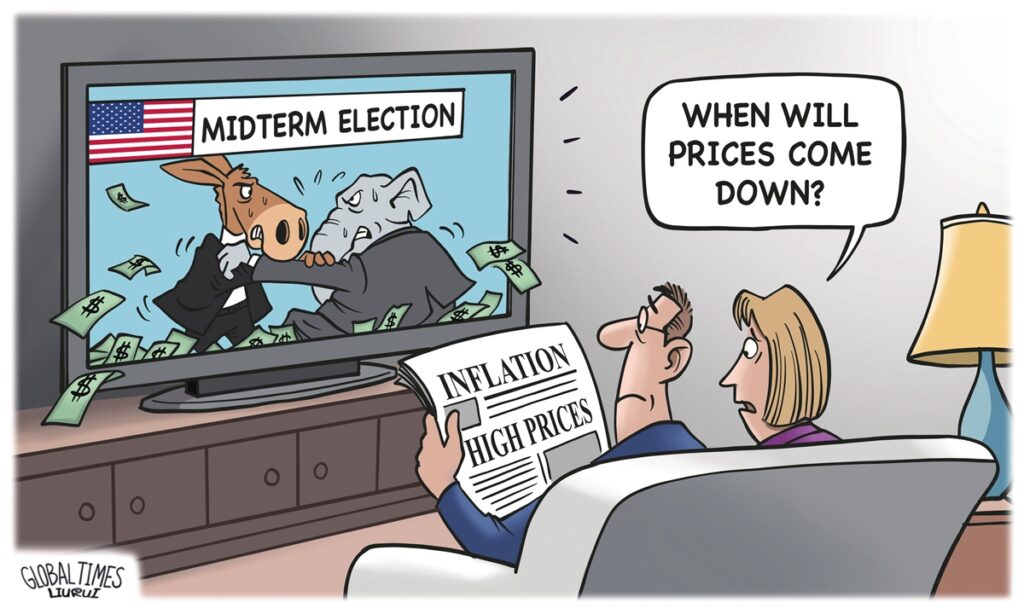It’s no secret that the US is divided. For the now “Disunited States of America,” as some US scholars and Western media call it, the idea of an American breakup is not that far-fetched. With the midterm elections just over a week away, Americans’ concerns are mounting over whether the US is on a trajectory to a new civil war.
According to a recent Time article, “41 percent of Biden voters and 52 percent of Trump voters polled favor red or blue states seceding from the Union to form their own separate country, with 30 percent of Republicans and 11 percent of Democrats ready to resort to violence to save the country.” That is to say, approximately 20 million Americans are ready to fight in a country with 400-plus million guns. In early October, the New York Times quoted a date entry specialist as saying he worries something will happen around the November elections that will be “akin to Jan 6, but much more violent,” where armed protest groups from both sides of the political spectrum come to blows.
Since the Capitol riots on January 6, 2021, “civil war” references have been growing in the US. The US is at a “greater risk” of civil conflict than during the Great Depression, historian Jon Meacham, who occasionally served as a speechwriter for US President Joe Biden, said in an interview with NPR earlier this month.
In her bestseller “How Civil Wars Start: And How to Stop Them,” Barbara F. Walter, a political science professor at the University of California at San Diego, warned that the US is coming dangerously close to those conditions that give rise to a civil war.
Increasing discussions over a new civil war are an embodiment of Americans’ concerns and anxieties about the multiple crises the US is being confronted with. Polarization – the sharp division between Republicans and Democrats as well as within their own bases -has become the largest weakness and ill of the US today. Confrontation between the two camps will be continuously amplified especially during the election season. Political polarization, social division and economic hardships all could make Americans go radical.
The US is currently facing many challenges, including inflation, racial and gender inequality, crimes, drug abuse, climate change, immigration and so on. If Americans fundamentally distrust each other and try to veto any solutions the other has to offer, then all of these problems will become more difficult, if not impossible, to solve. For a long time, in areas such as fight against epidemic, economic development, electoral reform and gun control, the two US parties confront each other fiercely. It’s increasingly difficult and impossible for the ”Disunited States of America” to fix its social woes and have effective governance.
In the Time article entitled “The US is Heading Toward a Second Civil War. Here Is How We Avoid It,” the author, a professed conflict mediator and depolarization pundit, pondered how to help US’ deeply divided, furious society avert another civil war. He suggested depolarization initiatives such as local, community-based bridge-building groups to make efforts to bring red and blue Americans together across their differences to talk respectfully. But these measures are far from being able to save the ailing country.
“At the moment, however, there seems to be no program for resolving the differences. Both parties seem to be largely controlled by their more radical elements, making bridge-building very difficult, if not impossible,” William Jones, the Washington bureau chief for the Executive Intelligence Review, told the Global Times. He noted that although new voices emerge in the new groups of people in both the Democratic and Republican parties who will be running for office in November, any process of reconciliation will be both long and hard, and it will require a leading figure who’s prepared to tackle the issue. “Right now, no such a figure is visible on the horizon,” Jones said.
The divided US is currently like a powder keg. Zhang Tengjun, deputy director of the Department for Asia-Pacific Studies at the China Institute of International Studies, believes the US has actually been in a “cold” civil war marked by intractable polarization and distrust. “There is only a stone’s throw away from a ‘hot’ civil war and the last straw could be likely easily ignited,” he said. Analysts warned that the US has more guns than people, and in a heavily armed society, radical forces who feel frustrated could easily resort to violence.
The US has been brutally interfering in other countries’ internal affairs for a long time, inciting other countries to split and creating confrontation, but now it is eating the bitter fruit of its own internal division. No one will be surprised if another Capitol riot, a similar event, or even an American secession happens.
US house speaker Nancy Pelosi’s home in San Francisco was broken into and her husband was attacked. Whether it’s a true assault or a self-staged show, this episode before midterm elections is jaw-dropping enough. The “beautiful sight” has come to Pelosi’s home, what else is impossible for a country that is already deeply divided and beginning to fester?
(Global Times)




